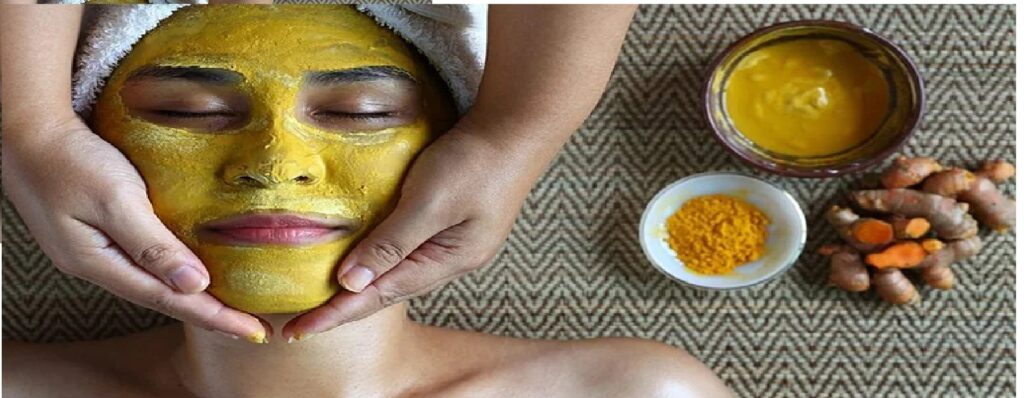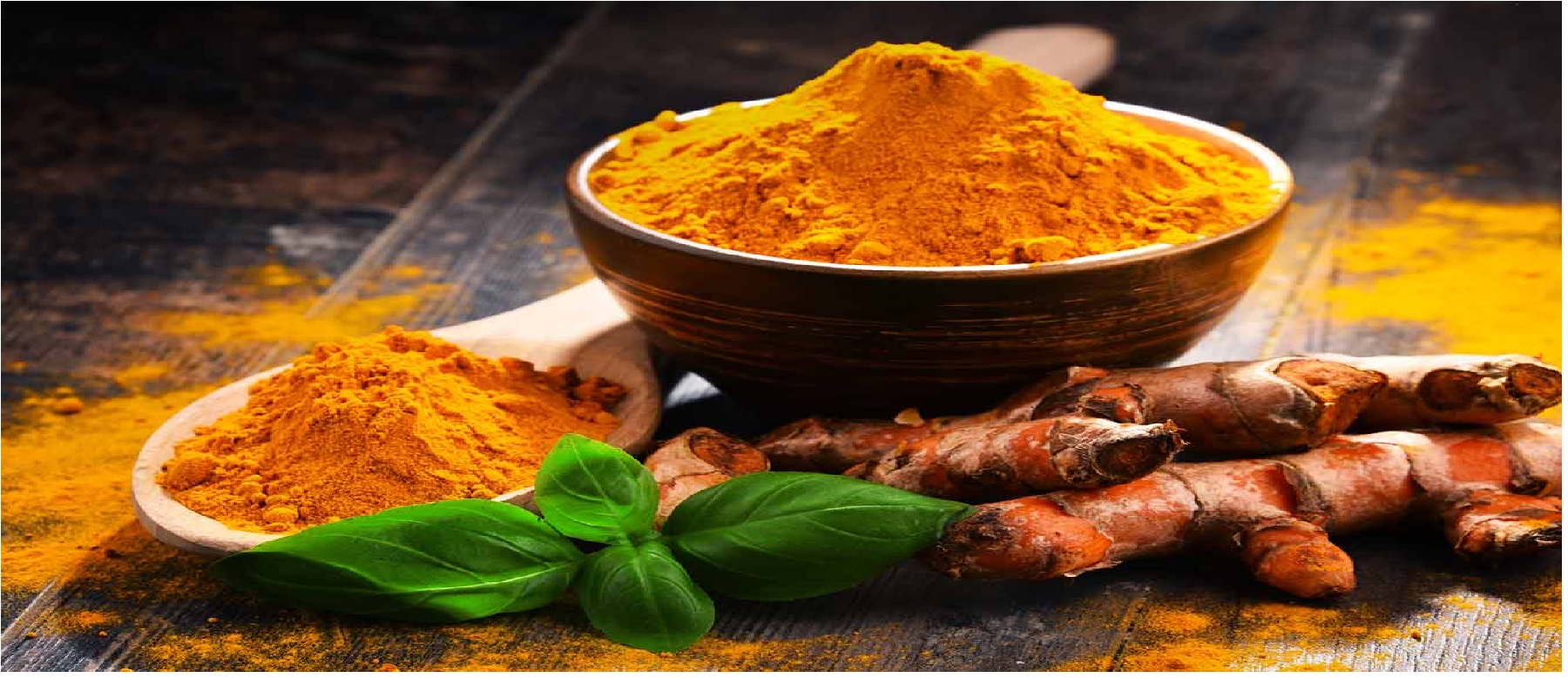In India, it was traditionally used for disorders of the skin, upper respiratory tract, joints, and digestive system. Today, turmeric is promoted as a dietary supplement for a variety of conditions, including arthritis, digestive disorders, respiratory infections, allergies, liver disease, depression, and many others.
Antioxidant to your body and skin

One of the main benefits of turmeric is that it has antioxidant properties. One of the factors underlying ageing and many diseases is oxidative damage. When free radicals interact with organic components in the body, negative effects might result. Curcumin, a potent antioxidant found in turmeric, has the ability to neutralize free radicals and offer protection against them. Additionally, curcumin activates the body’s defense against free radicals.
In the bustling realm of health and skincare, antioxidants emerge as unsung heroes, weaving their magic not only within the confines of our bodies but also on the canvas of our skin. These microscopic guardians play a pivotal role in safeguarding our well-being and enhancing our natural beauty. Let’s embark on a journey to unravel the profound impact antioxidants have on both body and skin.
The Body’s Inner Sanctuary
At the core of our physiological well-being lies a delicate balance between free radicals and antioxidants. Free radicals, unstable molecules generated by various internal and external factors, can wreak havoc on our cells, contributing to aging and chronic diseases. Antioxidants, on the other hand, act as vigilant sentinels, neutralizing these free radicals and preventing cellular damage.
Ingesting a diet rich in antioxidants is akin to fortifying our body’s defenses. Fruits, vegetables, nuts, and whole grains are treasure troves of antioxidants, offering a diverse range of compounds such as vitamins C and E, beta-carotene, and selenium. These mighty molecules not only combat oxidative stress but also foster overall health, supporting the immune system and reducing the risk of chronic illnesses.
The Skin’s Elixir of Youth
Our skin, the largest organ, is a testament to the passage of time and the external forces it encounters. Enter antioxidants, the secret sauce for a radiant complexion. These superheroes work to counteract the damage inflicted by environmental assailants like UV rays and pollution, preserving the skin’s elasticity and suppleness.
Vitamin C, a potent antioxidant, takes center stage in the skincare arena. Its ability to neutralize free radicals promotes collagen synthesis, ensuring skin remains firm and youthful. Meanwhile, vitamin E acts as a shield against sun damage, reducing the risk of premature aging and supporting the skin’s natural repair mechanisms.
Beyond vitamins, a spectrum of antioxidants found in botanical extracts, like green tea and grape seed, add a luxurious touch to skincare routines. These natural wonders contribute to a luminous complexion, soothing inflammation, and rejuvenating tired skin.
Synergy of Internal and External Nourishment
The synergy between internal antioxidant intake and external skincare rituals creates a harmonious symphony for overall well-being. A balanced diet coupled with antioxidant-rich skincare products fortifies our body’s resilience against the relentless march of time and external stressors.
Diabetes and Turmeric

Turmeric improves glucose regulation and enhances the efficacy of diabetes medicines. By assisting in regulating insulin levels, this potent herb can be used as an addition to conventional diabetic therapies. Additionally, it reduces insulin resistance, which can aid in delaying the onset of type 2 diabetes. The best course of action is still to speak with a doctor before adding natural diabetic therapies to a regimen.
Turmeric for treatment of Cancer

Although there are many different types of cancer, they all share characteristics that curcumin and turmeric may be able to aid with. On a molecular level, the herb may be able to affect the growth, development, and dissemination of skin, stomach, colon, and breast cancer cells. Additionally, studies suggest curcumin may slow the development of new blood vessels in tumors that already exist, stop metastasis (the spread of cancer), and maybe aid in the killing of cancerous cells.
In the ever-evolving landscape of holistic health, turmeric, the golden-hued spice, has emerged as a beacon of hope for those navigating the challenges of diabetes. Beyond its culinary allure, turmeric boasts a rich history as a medicinal powerhouse, with modern research shedding light on its potential benefits for diabetes management. Let’s delve into the captivating synergy between diabetes and turmeric’s radiant spice.
The Curcumin Connection
At the heart of turmeric’s therapeutic potential lies curcumin, a bioactive compound revered for its anti-inflammatory and antioxidant properties. Research suggests that curcumin may play a pivotal role in modulating various factors associated with diabetes, making it a subject of interest for both traditional healers and modern scientists.
Blood Sugar Regulation
One of the primary concerns in diabetes management is the regulation of blood sugar levels. Curcumin has been shown to enhance insulin sensitivity, facilitating the efficient utilization of glucose by cells. This promising aspect not only aids in blood sugar control but also holds the potential for preventing insulin resistance, a hallmark of type 2 diabetes.
Inflammation Alleviation
Chronic inflammation is often a companion to diabetes, contributing to insulin resistance and complications. Turmeric’s curcumin content exhibits potent anti-inflammatory effects, potentially mitigating inflammation and offering relief to those managing diabetes. This dual action of blood sugar regulation and inflammation reduction positions turmeric as a holistic ally in diabetes care.
Antioxidant Armor
Diabetes is associated with oxidative stress, where an imbalance between free radicals and antioxidants can lead to cellular damage. Curcumin’s antioxidant prowess comes to the forefront, scavenging free radicals and potentially mitigating the oxidative burden faced by individuals with diabetes. This antioxidant armor may contribute to long-term health benefits and prevent diabetes-related complications.
Exploring Turmeric in Diabetes Management
Incorporating turmeric into the daily routine can be a flavorful and potentially beneficial strategy for diabetes management. Whether enjoyed in culinary creations, such as curries and teas, or through supplements with standardized curcumin extracts, individuals with diabetes may find this golden spice to be a welcome addition to their wellness toolkit.
Caution and Consultation
While the potential benefits of turmeric for diabetes management are exciting, it’s crucial to approach its incorporation with care. Individuals with diabetes should consult with healthcare professionals before making significant changes to their dietary or supplemental routines. Turmeric supplements, in particular, should be used judiciously, considering individual health conditions and medication interactions.
Cholesterol treatment with Turmeric

There are numerous negative health effects of high cholesterol. According to studies, adding turmeric to your diet as a seasoning can considerably cut blood cholesterol levels and suppress the formation of arterial plaque, which is crucial for preventing cardiovascular problems and other major health conditions.
Alzheimer’s Disease Treatment with Curcumin

In the realm of neurological health, Alzheimer’s disease stands as a formidable adversary, casting a shadow on the cognitive well-being of millions. Amidst the ongoing pursuit of effective treatments, curcumin, the golden compound found in turmeric, emerges as a beacon of hope. Let’s embark on a journey to unravel the potential role of curcumin in the treatment of Alzheimer’s disease, exploring the promising research and the intricate connection between this golden compound and cognitive health.
The Curious Case of Curcumin
Curcumin, renowned for its anti-inflammatory and antioxidant properties, has garnered attention not just in culinary circles but also in scientific arenas. Research into curcumin’s potential therapeutic applications has intensified, with a particular focus on its neuroprotective effects and its ability to cross the blood-brain barrier, a critical factor in combating Alzheimer’s disease.
Anti-Inflammatory Armor
Chronic inflammation is believed to play a pivotal role in the progression of Alzheimer’s disease, contributing to the formation of amyloid plaques and tau tangles. Curcumin, with its potent anti-inflammatory properties, has been investigated for its capacity to quell neuroinflammation, potentially slowing the degenerative processes associated with Alzheimer’s.
Beta-Amyloid Plaque Disruption
A hallmark of Alzheimer’s disease is the accumulation of beta-amyloid plaques, which are believed to disrupt communication between brain cells. Studies suggest that curcumin may interfere with the aggregation of these plaques, potentially preventing their formation and even promoting their clearance. This unique ability positions curcumin as a compelling candidate in the quest to halt the progression of Alzheimer’s disease.
Neuroprotective Potential
Curcumin’s multifaceted nature extends beyond its anti-inflammatory and plaque-disrupting qualities. It has been shown to possess neuroprotective properties, fostering the growth of new neurons and supporting overall brain health. This regenerative potential is a beacon of hope for individuals grappling with the cognitive decline associated with Alzheimer’s.
Navigating the Research Landscape
While the preliminary findings regarding curcumin and Alzheimer’s disease are promising, it’s essential to approach the subject with a discerning eye. The complexity of Alzheimer’s demands comprehensive research, and ongoing clinical trials are exploring curcumin’s efficacy in diverse populations. As we await conclusive evidence, individuals and caregivers are advised to consult with healthcare professionals before incorporating curcumin supplements into Alzheimer’s treatment plans.
Treatment of Skin Conditions using Turmeric

Anti-Inflammatory Powerhouse
Turmeric owes much of its skin-soothing prowess to curcumin, the active compound responsible for its distinct color. Curcumin’s potent anti-inflammatory properties make turmeric a valuable asset in the treatment of inflammatory skin conditions such as acne, eczema, and psoriasis. Its ability to calm irritated skin and reduce redness is a testament to its natural healing potential.
Acne Alleviation
For those grappling with acne, turmeric’s antibacterial properties can be a game-changer. Creating a turmeric face mask by combining it with ingredients like honey or yogurt can help combat acne-causing bacteria, reduce inflammation, and soothe existing breakouts. Regular application may contribute to a clearer complexion without the side effects often associated with harsher chemical treatments.
Eczema and Psoriasis Support
The dry, itchy patches characteristic of eczema and psoriasis can benefit from turmeric’s moisturizing and anti-inflammatory attributes. Applying a turmeric-infused ointment or incorporating it into a gentle moisturizer may provide relief, helping to calm flare-ups and restore the skin’s natural balance.
Hyperpigmentation and Scarring
Turmeric’s brightening properties make it a natural choice for addressing hyperpigmentation and scars. Regular application of a turmeric paste or mask may help even out skin tone, reduce the appearance of dark spots, and promote a more luminous complexion. Its antioxidant content contributes to skin repair, aiding in the fading of scars over time.
Caution and Sensitivity
While turmeric offers a plethora of benefits for skin health, it’s essential to approach its use with care. The vibrant pigment can temporarily stain the skin, and individuals with sensitive skin may experience irritation. Performing a patch test and avoiding prolonged contact can help mitigate these concerns. Consulting with a dermatologist is advisable, especially for those with pre-existing skin conditions or allergies.
Treatment of Arthritis using Turmeric

Loose your weight using Turmeric

Find out about more Medicinal plants for the treatment of various diseases
Visit our YouTube channel for the video
For more articles, Kindly Click here.
For pharmaceutical jobs, follow us on LinkedIn, Jobs in the United Kingdom
For Editable SOPs in Word, format contact us on info@pharmaguidelines.co.uk
FAQs
1. What is Ayurveda, and how does it relate to turmeric?
- Ayurveda is a traditional system of medicine originating in India. Turmeric is a key herb in Ayurveda and is used for its various health benefits.
2. What is turmeric, and what are its active compounds?
- Turmeric is a bright yellow spice derived from the root of the Curcuma longa plant. Its active compounds include curcumin, which has many therapeutic properties.
3. What are the Ayurvedic health benefits of turmeric?
- Turmeric is believed to have anti-inflammatory, antioxidant, and antimicrobial properties, making it useful for various health conditions in Ayurveda.
4. How is turmeric used in Ayurveda?
- Turmeric can be used in various forms, including powder, capsules, teas, and topical applications like paste or oil. It can be incorporated into diet and skincare routines.
5. What are some common Ayurvedic remedies using turmeric?
- Turmeric is used to alleviate digestive issues, boost immunity, reduce inflammation, improve skin health, and promote overall well-being in Ayurveda.
6. Can turmeric be used to treat specific health conditions in Ayurveda?
- Yes, Ayurveda suggests using turmeric for conditions like arthritis, digestive disorders, respiratory issues, and skin problems.
7. How can I make a turmeric paste for topical applications?
- To make a turmeric paste, mix turmeric powder with water or oil to create a thick, consistent paste. You can add other ingredients like honey or yogurt for specific purposes.
8. Are there any precautions or side effects associated with using turmeric in Ayurveda?
- While turmeric is generally safe, excessive consumption may lead to digestive issues. It can also interact with certain medications, so consult with a healthcare professional before use.
9. Can pregnant or breastfeeding women use turmeric in Ayurveda?
- Pregnant and breastfeeding women should consult with a healthcare provider before using turmeric supplements or consuming it in large amounts.
10. Where can I find high-quality turmeric for Ayurvedic use? – You can find good quality turmeric in spice stores, health food stores, or online. Look for organic, pure turmeric powder or supplements.
11. How long does it typically take to see results when using turmeric in Ayurvedic treatments? – The time it takes to see results may vary depending on the condition being treated and the individual’s response. It’s best to follow Ayurvedic recommendations and be patient.
12. Can I use turmeric as a preventive measure for general health in Ayurveda? – Yes, turmeric is often used as a preventive measure in Ayurveda due to its immune-boosting and anti-inflammatory properties. It can be included in daily routines for overall well-being.
Pharmacareer team is a team of Experts from every department of Pharmaceutical industry having enriched experience. Experts have work experience of many multinational pharmaceutical industries worldwide.


